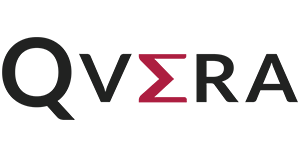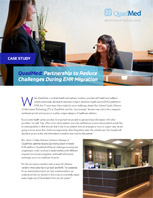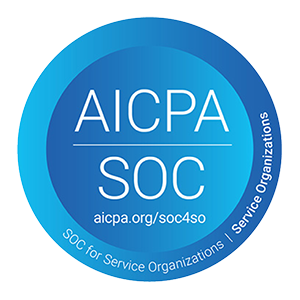QuadMed:
Epic EHR interoperability made easy

When QuadMed, a worksite health and wellness solutions provider with health and wellness centers nationwide, decided to transition to Epic’s electronic health record (EHR) platform in 2018, the IT team knew there might be some challenges ahead. But, Edward Godin, Director of Information Technology (IT) at QuadMed, said this “very strategic” decision was vital to the company’s continued growth and success in a rather unique category of healthcare delivery.
“As an onsite health center provider, it’s important we are able to get and share information with other providers,” he said. “Epic offers more robust patient care tools and features a more robust patient portal. But its interoperability is what ensures that if one of our patients visits an emergency room or urgent care, we are going to know about that. And more importantly, when the patient seeks this outside care, that hospital will also have access to the vital information it needs to best care for the patient.”
But Jason Crowley, Business Solutions Manager at QuadMed, said that despite Epic being a best-of-breed EHR platform, QuadMed still faced challenges ensuring the organization could continue to easily interface with different required immunization registries and health information exchanges across its multistate footprint.
“All told, we need to interface with at least 60 different vendors where data has to go back and forth,” he explained. “As we started planning for our Epic implementation, we understood that we needed to find a way to essentially repipe every single one of those feeds from our old system.”
“All told, we need to interface with at least 60 different vendors where data has to go back and forth. As we started planning for our Epic implementation, we understood that we needed to find a way to essentially repipe every single one of those feeds from our old system.”
Jason Crowley – Business Solutions Manager – QuadMed
Interfacing with state registries
Sarah Lock, a Nurse Practitioner and QuadMed’s Population Health Excellence Specialist, said being able to “connect” to state immunization registries is important not only to meet state requirements for reporting, but also to provide the highest quality care to our patients.
“Without an interface to these registries, the process for verifying and documenting immunizations is more cumbersome,” she said. “There’s also an increased risk for errors as a result of the manual data entry.”
Today, patients may receive common immunizations from multiple providers across the community or from a local pharmacy. Without easy and reliable access to state registry data, Lock said providers may not know that a patient has already received a flu vaccine, or perhaps needed to have an additional measles, mumps, or rubella booster. Without complete and accurate information, providers run the risk of readministering a certain vaccine or ordering laboratory testing for immunity when it is unnecessary.
“No one wants to put a patient through unnecessary testing or extra vaccinations. We don’t want patients to bear additional costs because of the administration of unnecessary vaccines either,” she said. “So, when we can interface with the registries straight through our EHR, it saves a lot of time and resources.”
In addition, Lock added, access to immunization data also provides critical information for her own work in enhancing the health and wellbeing of the different populations QuadMed serves.
“We have a population registry that lets us know how we are doing with preventative screenings, chronic conditions, and immunizations,” she said. “We also need immunization data for our quality metric reporting. It’s very important to us that we’re providing our patients with the highest quality care — a simple interface that allows easy access to immunization information is vital.”
“No one wants to put a patient through unnecessary testing or extra vaccinations. We don’t want patients to bear additional costs because of the administration of unnecessary vaccines either. So, when we can interface with the registries straight through our EHR, it saves a lot of time and resources.”
Sarah Lock – Nurse Practitioner and Population Health Excellence Specialist – QuadMed
An easier way to interface
Interoperability within healthcare IT systems remains an industry challenge. While there are many different applications and platforms in use, there is not one standard interoperability format for sharing data. As such, healthcare organizations that need to connect with different information exchanges rely on Health Level 7 (HL7) interface engines to allow data to flow where it needs to go. Alicia Saccomando, a Business Analyst Lead with QuadMed, said it was important that any interface engine used allowed QuadMed not only to extract, send, and receive the data needed from different registries, but also to define different rules for what information is sent.

“Each of the states has its own rules and requirements, and it can be difficult to manipulate the transactions coming out of the EHR to say, ‘This information needs to go to Virginia’s registry, but we need that plus some other information for Indiana,’” she explained.
That’s why QuadMed decided to partner with Qvera, a healthcare interoperability vendor, to create those necessary interfaces. Saccomando said its Qvera Interface Engine (QIE) makes it easy to design each interface to make sure QuadMed is meeting all state requirements for reporting, and that the different registries are getting the information they want and in the way they want it.
“With Qvera, we were able to move from having multiple separate channels for sending data to having a single channel for all outbound immunizations,” she said. “And using QIE made it very easy for us to take the raw files from Epic and make whatever manipulations necessary to provide each state with the right information in the right format.”
Crowley added that QIE offers IT staff members unparalleled abilities to maintain and control all data flowing in and out of their new Epic EHR. He also appreciates that Qvera made it very easy for him and his team to build and test the interfaces they created in avoidance of any errors.
“Qvera has a great way of laying out the different requirements so you can really see what changes you are making,” he said. “It makes the design easy. But it also makes testing the interfaces you create a lot easier because of its robust error tracking notifications.”
“With Qvera, we were able to move from having multiple separate channels for sending data to having a single channel for all outbound immunizations. And using QIE made it very easy for us to take the raw files from Epic and make whatever manipulations necessary to provide each state with the right information in the right format.”
Alicia Saccomando – Business Analyst Lead – QuadMed
Moving Forward
Godin said that with the use of Qvera to help with data flow, QuadMed’s transition to Epic was made all the easier. He said the providers — and other key stakeholders — are very happy with the new platform.
“While it can always take some time to settle in and learn new tools, go-live went smoothly,” he said. “The feedback has been really positive — and we can already see the move to Epic has made a tremendous impact to our organization and sets us up for success in the future.”
Now that the IT department has seen what it can do with QIE interfaces and state immunization registries, the team is now working toward creating new interfaces for other industry platforms.
“One of the best things about QIE is that we’re able to take the data out of Epic and do what we need to do with it,” said Saccomando. “That really makes all the difference in making sure our providers, as well as other important healthcare entities, have the data they need to provide the highest quality care to our patients.”
“While it can always take some time to settle in and learn new tools, go-live went smoothly. The feedback has been really positive — and we can already see the move to Epic has made a tremendous impact to our organization and sets us up for success in the future.”
Edward Godin – Director of Information Technology – QuadMed
Produced by HIMSS Media | www.himssmedia.com | © 2020


